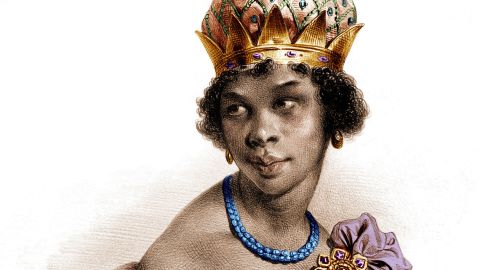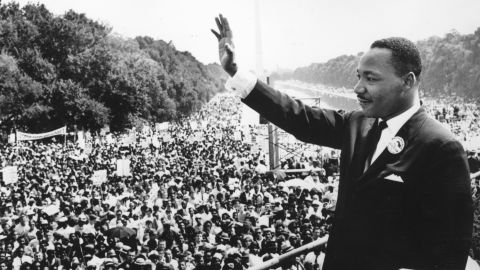Washington CNN —
In the early 2000s, when I was a student at Ridge View High School, in Columbia, South Carolina, I loved to parse the legacies of certain historical figures: W.E.B. Du Bois, in AP US History; Malcolm X, in AP English Language and Composition.
At the same time, I wanted more. Too often, Advanced Placement curricula seemed to give attention to just a handful of Black heavyweights and, as a result, neglect the countless ways Black Americans have shaped US society. Only rarely were Black students like me reflected in lessons. (I remember learning about “A Raisin in the Sun,” Lorraine Hansberry’s jewel of a play about a Black family in south Chicago, from my mom and wondering, Why aren’t we studying this in school?)
But things are beginning to change. Ridge View is one of about 60 high schools across the country piloting AP African American Studies in 2022. The interdisciplinary course will be the newest addition to the College Board’s panoply of AP offerings and delve into the history of the African continent and Black contributions to music, literature, science, politics and mathematics, among other fields. Mere weeks into the pilot course, students and faculty at Ridge View already see AP African American Studies as something of a salve. The course arrives at a moment when instruction about race is under siege: Educational gag orders abound, and “critical race theory” has become a lightning rod for the right.
Given the meager representation I observed as a high school student, I was stunned – and thrilled – to learn that Ridge View, which is majority Black, is piloting AP African American Studies. It would’ve been so welcome, I thought, to see myself in this context, to probe questions of identity and inheritance.
Plus, it’s no small thing to test out the course in South Carolina, which didn’t banish the Confederate battle flag from statehouse grounds until 2015, in the heartrending aftermath of a White supremacist massacre.
The significance of the moment isn’t lost on Ridge View students.
“It really makes me happy to be in this class – to know that I’m a part of history,” Nacala McDaniels, a senior, told CNN.
In August, the Harvard University professor Henry Louis Gates Jr., one of the architects of the AP African American Studies curriculum, stressed the course’s educational value.
“Nothing is more dramatic than having the College Board launch an AP course in a field – that signifies ultimate acceptance and ultimate academic legitimacy,” he told Time magazine. “It is a mainstream, rigorously vetted, academic approach to a vibrant field of study, one-half a century old in the American academy, and much older, of course, in historically Black colleges and universities.”
Like so many in the Ridge View community, McDaniels wants AP African American Studies to help not only other Black students but all students become well-versed in under-told histories and cultures and incubate meaningful discussions about race.
“I hope that the course will be offered to other people who look like me and to other people who just want to learn about history that’s been covered up and history that’s been ignored,” she said. “And I hope that the course makes room for more conversation. Lots of people are scared to talk about race, but with more conversation comes better understanding.”
High schools had been hungry for an AP African American Studies course for years. However, when the College Board asked universities about a decade ago if they’d give credit for a corresponding exam, they said no.
But the uprisings of 2020 caused a long-overdue shift.
“The events surrounding George Floyd and the increased awareness and attention paid toward issues of inequity and unfairness and brutality directed toward African Americans caused me to wonder, ‘Would colleges be more receptive to an AP course in this discipline than they were 10 years ago?’” Trevor Packer, who heads the College Board’s AP program, told Time.
Yes, was the answer.
Maybe the most exciting thing about teaching AP African American Studies is the fact that educators get to talk about people, subjects and slices of history students don’t know much about, according to Daniel Soderstrom, who leads the course at Ridge View.
“Over the past few decades, we, as a society, have done a better job of teaching Black history and African American Studies. But I’d argue that many teachers still fall short,” he told CNN. “What I mean is that our kids hear the same stories every year. And that’s not to diminish the contributions of Rosa Parks or Martin Luther King Jr. But if those are the only people our students are learning about in school, they’re missing a lot of what’s really there.”
The first part of the course examines early African kingdoms and some of their foundational figures, including Queen Nzinga of Ndongo, located in present-day Angola.

“She was a very strong woman – a heroine – and fought on the front lines with her soldiers,” Soderstrom said of Nzinga, celebrated for pushing back against Portuguese colonization and the trade of enslaved people in Central Africa in the 16th and 17th centuries. “But we tend to skip the stories of people from Africa.”
So far, the lessons appear to be resonating with the kids.
“I didn’t even know that there were any queens in Africa in any time period. Like, at all,” Ashton Walker, a junior, told CNN. “We got to learn about Queen Nzinga and Idia. They’re both very interesting because they were powerful women leaders who did amazing things for their kingdoms.”
Walker, who’s White, sees AP African American Studies as a means toward visibility for her Black peers, who get to be participants in their history.
“It matters that we get to learn all these things as a society. We don’t ever really get to hear about any of these figures or what they went through,” she said. “And my (Black) classmates deserve to hear this history. It’s awesome that Ridge View is a majority-Black school and gets to help create this course.”
Her mother, Nicole Walker, who was involved in bringing the pilot course to Ridge View and is the director of the school’s Scholars Academy Magnet for Business and Law (she also was my 9th grade English teacher), echoed some of these sentiments.
“We know that what’s best for kids is for them to see themselves reflected in the curriculum, for them to celebrate their cultures, for them to feel valued,” she told CNN. “We know that a kid who feels safe and valued is going to do better in school.”

Jacynth Tucker, a senior, is intimately familiar with the power of inclusivity. She said that at a previous school, she and other Black students felt invisible.
“I can’t even remember a time when we really explored Africa – talked about the history and the culture,” she told CNN. “Being in a class where that’s more of a focus is very special to me.”
Further, the course gives Black Americans more dimension, per Clementine Jordan, a senior.
“One activity I really liked was when our teacher showed us a collage and asked, ‘What do all these people have in common?’” she told CNN. “Their commonality was that they’re all Black. But the point of that discussion was that, yes, they’re all Black, but there’s so much diversity within the Black community, within my community: diverse religions, gender expressions, sexualities, things like that.”
Crucially, Soderstrom noted that AP African American Studies isn’t a standard-issue history course, though it proceeds in a relatively chronological fashion and will eventually make its way to the US.
“We’re studying Black excellence and African American success through art, through literature, through culture, through dance, through mathematics, through science, through lawyering,” he said. “It’s interesting that one day we’re looking at an art piece, the next day we’re listening to music, the next day we’re reading a poem and then the day after that we’re listening to a mathematician speak.”
In other words, while the course charts struggles – including the mid-century civil rights movement – it also underscores Black excellence in a variety of disciplines.
It’s pretty much impossible to separate the debut of the AP African American Studies pilot course from the Republican-led racial panic looming over many schools.
According to an August analysis by PEN America, a literary and free expression organization, legislators in 36 states have introduced 137 laws this year restricting discussions about race, US history and gender in K-12 schools and higher education. This figure is a 250% increase over 2021.
And last month, the American Library Association predicted that the number of attempts this year to censor books in K-12 schools, universities and public libraries grappling with race, gender and sexuality will exceed 2021’s record count. The ALA tallied 681 attempts between January 1 and August 31; the 2021 total was 729.
These attacks seek to determine what content is and isn’t legitimate in an academic context; they’re part of a much broader counter-mobilization against efforts to topple racial and social hierarchies.
“We’re not seeing different political conflicts. We’re seeing one big political conflict – one big reactionary political project,” as Thomas Zimmer, a visiting professor at Georgetown University, where his research focuses on the history of democracy and its discontents, told CNN in July.
Yet Soderstrom minced no words: AP African American Studies is a vital course, regardless of anyone’s political affiliation.
“Henry Louis Gates Jr. is one of the senior minds when we’re talking about American studies and African American history. He was quoted recently explaining that the course isn’t political,” Soderstrom said. “We’re teaching factual information, and everything is verifiable.”
Lylou, a sophomore, shared this conviction.
“I’m a White person, and I wanted to take this class because I don’t know that much about Black history,” she told CNN. “The course should be in the curriculum. Because why would we want to ignore this history?”
(Lylou’s mother asked that her daughter’s last name not be included, given the intense political climate hovering over lessons about race in the US.)
The pilot course is expected to expand to include additional high schools next year and then be available to all interested schools the following year, per the College Board.
Ridge View kids, for their part, seem eager to see how the rest of the year unfolds.
“The class is a learning opportunity for everybody. I take every interaction I have with anybody as a learning experience,” McDaniels said.
Then, mirroring the same fundamental curiosity I had as a high school student nearly two decades ago, she added, “I’m just excited to see what’s next.”


